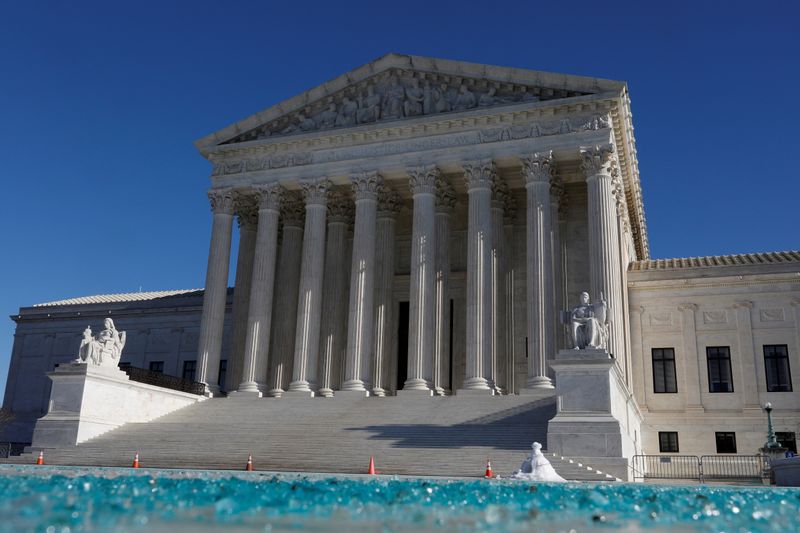By Andrew Chung and Jarrett Renshaw
(Reuters) - The first major lawsuit hit President Joe Biden's administration two days after he took office, providing an early test not only of how much conservative legal opposition his policies will draw but also of his strategy in fending off such challenges.
Unlike his Republican predecessor Donald Trump, whose administration sought to rush cases to a U.S. Supreme Court it considered friendly territory, Biden's team may not be able to count on a sympathetic audience among the conservative justices who hold sway on the nation's top judicial body.
The Jan. 22 lawsuit was filed by Texas Attorney General Ken Paxton, a staunch Republican ally of Trump, challenging Biden's 100-day moratorium on deportation of many immigrants. The judge in the case on Tuesday temporarily blocked Biden's action while the litigation continues, with the potential that the matter could end up at the Supreme Court.
The high court's 6-3 conservative majority includes three Trump appointees. Trump's administration took a particularly aggressive stance when judges blocked his policies by quickly and repeatedly turning to the high court - sometimes bypassing intermediate federal appeals courts - in a way that broke norms.
Legal experts said Biden's team is unlikely to use the same playbook given a Supreme Court ideological makeup that signals skepticism toward liberal policy approaches.
The Justice Department's Office of the Solicitor General, which handles the federal government's cases at Supreme Court, will play a key role.
Biden has not yet chosen his nominee for solicitor general, but Washington lawyers Nicole Saharsky, David Frederick and Andrew Pincus are among those being considered, according to two sources familiar with the process. Washington lawyer Elizabeth Prelogar, a veteran of the office, is serving as acting solicitor general. Biden has nominated federal appellate judge Merrick Garland as attorney general.
'MORE FAVORABLE FORUM'
The new solicitor general's office must decide whether it can attract the support of a majority of the Supreme Court's justices in a given case or whether it would be a "futile effort" even to try, said Ilana Eisenstein, a Philadelphia lawyer who worked in the office under Trump and his predecessor Barack Obama.
"Where there is a perception that the Supreme Court is the more favorable forum, whether for emergency relief or relief on the merits, there may be a rush to get there," Eisenstein said. "And where there is a perception that appeals courts are more favorable, there may be an effort to keep the matter in those lower courts."
In the past, a solicitor general typically sought the Supreme Court's attention only after lower courts had ruled. But Noel Francisco, solicitor general for most of Trump's presidency, repeatedly pushed the justices - often on an emergency basis - to hear cases or block unfavorable lower court rulings to keep contested policies alive.
Trump's administration asked the justices to block lower court rulings 41 times, according to University of Texas School of Law professor Stephen Vladeck, with the administration winning at least in part in 28 of those requests. In the 16 years prior, the Obama and George W. Bush administrations sought such relief eight times combined.
Vladeck said the numbers reflect a conservative Trump administration capitalizing on a reliably conservative court.
"You had probably a majority of the court that was sympathetic to Trump administration policies on the merits. It's hard to believe that is going to be true now," Vladeck added.
That could be the case on issues such as LGBT and religious rights, abortion and gun control.
"On certain culture war issues, those are ones that the Biden people probably wouldn't want to see go to the Supreme Court, at least in most cases," George Mason University law professor Ilya Somin added.
Biden's Justice Department declined to comment.
Paxton's lawsuit over Biden's deportation moratorium - a contrast to Trump's hardline immigration policies - was filed in federal court in Victoria, Texas. Paxton argued that Biden's action would cause Texas irreparable harm, increasing education and healthcare costs as more immigrants remained in the border state illegally.
Biden's Department of Homeland Security said the moratorium would help enable a review of operational challenges posed by the coronavirus pandemic. Paxton argued that the moratorium violated an enforcement agreement Texas brokered with Trump's administration. U.S. District Judge Drew Tipton, appointed by Trump, temporarily blocked Biden's policy nationwide, a quick setback.
Conservative legal advocates had complained that federal district judges were overstepping their authority when they imposed such nationwide injunctions blocking Trump's policies.
"There has been more attention given to that issue over the past few years, and I think more district judges on the whole are a little more inclined to grant narrower relief than they were four years ago," said John Elwood, a Washington attorney who has argued before the Supreme Court.
